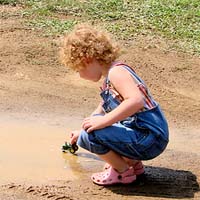When I was a kid, the neighborhood gang and I used to gather in the ‘dirt place’ at least twice a week to manufacture our famous mud pies. We dug up copious amounts of dirt in one bucket, processed and refined it by rubbing it over metal window screens into a second bucket, and then mixed it with hose water to make a smooth, gloppy mud-mess. It is probably one of my fondest memories from childhood, often tainted by my mother’s howling screams when we came home caked from head to toe in half-dried mud.
Mess is one of the biggest things that prevents us as parents from encouraging our kids to go play in the mud, but recent scientific research presented at the 110th General Meeting of the American Society for Microbiology in San Diego suggests we might want to reconsider our notions that mud and dirt are icky.
Mycobacterium vaccae, a bacteria found in soil and air, may actually promote learning and decrease psychological depression, stress and anxiety. Perhaps this is why I have such fond memories of playing in the ‘dirt place’ as a kid.
Researchers suggest this knowledge should encourage not only parents, but educators as well, to get kids outdoors during recess breaks to help them refresh their brains after a hard day of processing difficult learning tasks.
If you’re not keen on having your kids dig up the yard, consider planting a family garden together at the very least. Gardening itself has been proven time and again to stimulate relaxing seratonin, known to reduce stress, anxiety and depression.
With the summer sun beaming in at me from the window, and a soft breeze circling through the curtains as I type, my inner-child is longing to head outdoors now to dig in the dirt. Bring your shovel and the kids, and let’s make mud pies!
